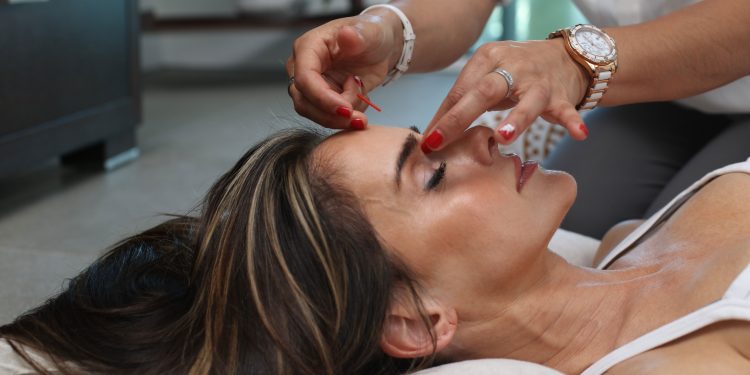Dr. Amy Ayla Wolf, DAOM
Chinese medicine (CM) has had a reference frame for understanding dysautonomia for thousands of years. What insights does CM provide—and can acupuncture and Chinese herbal medicine offer any solutions for dysautonomia? As a CM practitioner specializing in concussions, I can say from my experience, the answer is “Yes!”
Chinese medicine is often shrouded in mystery and confusion, with many misconceptions about how it works and what the terminology actually means. In this issue’s focus on dysautonomia, I wanted to share the CM perspective, and deconstruct it in a way that makes sense.
A famous book on Chinese medicine theory, “Huang Di Nei Jing,” was written in approximately 100 B.C.E. In this ancient book the authors describe a syndrome called a “Ying-Wei Disharmony.” Ying Qi is a term that is translated as “Nutritive” Qi. Ying Qi is most active at night while people are asleep, and allows for the repair and regeneration of the internal organs and digestive tract. Wei Qi is a term that is translated as “Defensive” Qi. It relates to functions of the immune system, and is said to be most active during the daytime. A Ying-Wei Disharmony occurs when the Wei Qi gets stuck in an active state all the time, and the Ying Qi is prevented from circulating at night, preventing the repair and regeneration of the body.
Ying-Wei Disharmonies reflect an imbalance in circadian rhythms, dysfunction of the immune system, and loss of integrity of the digestive system and healthy function of the internal organs. This ancient book includes the following symptoms in its description: heart palpitations, insomnia, numbness and tingling, stomach discomfort, intestinal dysfunction, chronic pain, pressure in the head, poor memory, eye movement disorders, breathing dysfunction, alternating chills and fevers, anxiety and emotional disorders.
What could possibly be going wrong in the body to elicit such a wide array of seemingly disconnected symptoms? What do the following have in common: insomnia, pain, fevers, digestive complaints, anxiety, tachycardia, poor breathing patterns, paresthesias, cognitive deficits, and blurry vision? The answer: the autonomic nervous system.
Today, we have a very clear understanding of the important functions of the autonomic nervous system, including the regulation of heart rate and rhythm, breathing and lung function, temperature regulation, immune regulation, sympathetic and parasympathetic balance, innervation of the internal organs including the spleen, stomach, and intestines, regulation of blood flow to the brain and body, and the top-down modulation of pain.
Today, we have a very clear understanding of the important functions of the autonomic nervous system, including the:
- regulation of heart rate and rhythm,
- breathing and lung function,
- temperature regulation,
- immune regulation,
- sympathetic and parasympathetic balance,
- innervation of the internal organs including the spleen, stomach, and intestines,
- regulation of blood flow to the brain and body, and
- the top-down modulation of pain.
We understand that people with dysautonomia can have a long list of possible symptoms that include:
- brain fog, headaches,
- chronic pain,
- lightheadedness,
- dizziness, nausea,
- rapid fluctuations in body temperature,
- low-level anxiety,
- insomnia,
- digestive dysfunction,
- difficulty breathing,
- numbness and tingling,
- immune dysfunction, and
- exercise intolerance, to name just a few.
It becomes fascinating then that 2,000 years ago, there was a description of a syndrome that matches exactly the same presentation of dysautonomia. Not only was there a theoretical framework for this disorder, there were also treatment strategies involving acupuncture and Chinese herbal medicine to address Ying-Wei Disharmonies.
In my work with patients with concussions, I assess the autonomic nervous system, and often see signs of dysautonomia. I treat these using acupuncture and Chinese herbs. The autonomic nervous system includes cortical areas such as the insula and prefrontal cortex, as well as the thalamus, hypothalamus, and brainstem. Many of the acupuncture points I use, have a modulatory effect on these structures, as observed through neuroscience research and brain imaging. The effects of my treatments are evident in the post-treatment neurological assessments that show better regulation of heart rate, blood pressure, and oxygenation. For example, prior to treatment, a recent patient with a concussion moved from laying down to standing, and her heart rate dropped 6 points. Following acupuncture, she got up from the table, and her heart rate appropriately increased by 6 points. Over the course of the following weeks, her dizziness improved and she no longer was having episodes of poor balance, dizziness, fatigue, and difficulty with speech and cognition.
I have also used Chinese herbal formulas that “Harmonize the Ying and Wei” to successfully treat symptoms of dysautonomia, including insomnia, anxiety, chronic nausea, fluctuating temperatures and dizziness.
Chinese medicine has a long-standing theoretical framework describing dysautonomia, as well as effective treatment strategies that include acupuncture and Chinese herbal medicine. Modern neuroscience researcher Florian Beissner says it best himself in his paper Effects of Acupuncture on the Autonomic Nervous System: Evidence from Brain Imaging. “The autonomic nervous system (ANS) controls the majority of organ functions in the human body. It coordinates such central processes as circulation, digestion, metabolism and immune functions. The scientific investigations of acupuncture has long focused on pain, while some of its strongest effects (e.g., on nausea and vomiting, migraine, hypertension, and inflammation) are most likely mediated by the ANS.”
Dr. Amy Ayla Wolf is a Doctor of Acupuncture and Oriental Medicine specializing in neurological disorders, concussions and traumatic brain injuries. She is a faculty member of the Carrick Institute of Clinical Neuroscience and Rehabilitation. She teaches courses for healthcare practitioners across the country on neuroanatomy, neurophysiology, functional neurological exam techniques, and neuro-rehabilitation utilizing acupuncture and Chinese medicine. She also offers advanced courses on concussion recovery. Her online courses and additional resources can be accessed at www.acupunctureneurology.com











